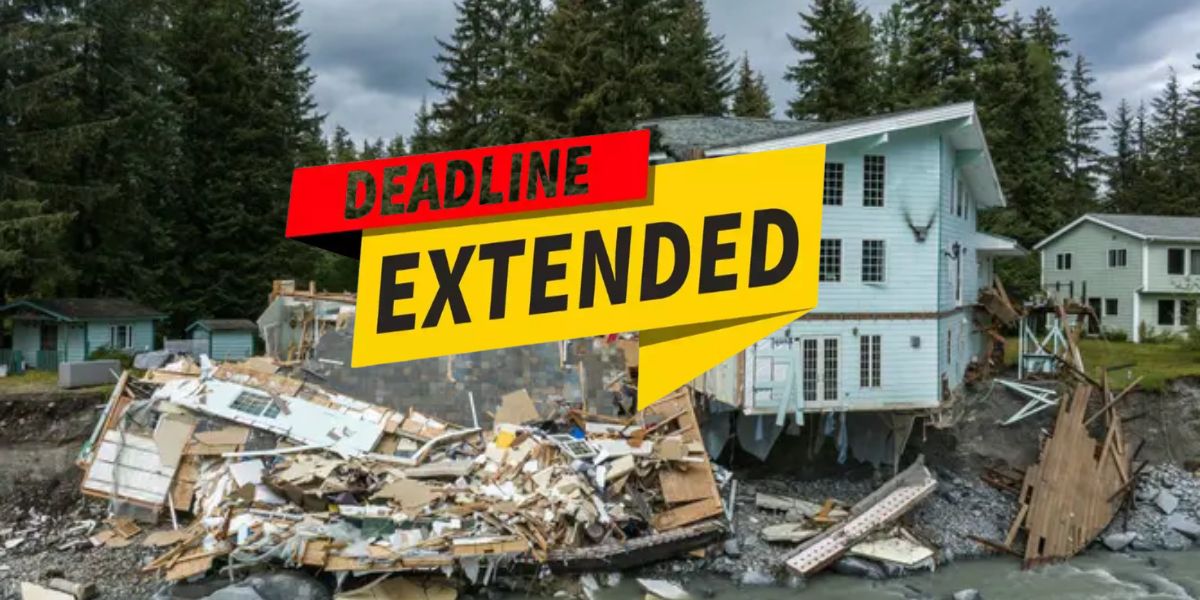Because extreme weather can disrupt almost every part of a person’s life, including filing taxes, the Internal Revenue Service offers grace periods to areas hit by severe catastrophes every year.
Residents who live in locations designated as significant disaster zones by the Federal Emergency Management Agency have once again had their tax filing deadline extended by the IRS in 2025.
Businesses and individuals in these designated disaster zones now have more time to submit their returns and make any necessary tax payments thanks to this automatic extension.
Due to recent natural catastrophes, taxpayers in North Carolina, South Carolina, Alaska, New Mexico, Tennessee, Virginia, West Virginia, Kentucky, California, and portions of Alabama, Florida, and Georgia will have modified filing deadlines this year.
These catastrophes include wildfires in Los Angeles County earlier this year and storms like Helene and Milton that hit the South last year.
Extensions may differ since state tax deadlines are set by each state and municipality, even though the IRS has modified the dates for federal tax files.
In light of the disaster, taxpayers are encouraged to inquire with their state to find out if local deadlines have been changed or delayed.
The IRS claims to have a dedicated hotline at 866-562-5227 for taxpayers with tax inquiries pertaining to disasters.
Information about weather disaster taxes in Alabama
Even though there was little damage along the central Gulf Coast after Hurricane Helene in 2024, the entire state was granted extra weeks to file.
Wind gusts of tropical-storm intensity were often more common in eastern Alabama and far less common in western Alabama.
The deadline for impacted taxpayers to submit their federal tax returns and make the necessary payments is now May 1, 2025.
Click here for further details for filers in Alabama.
Information on Alaska’s weather disaster tax
According to the IRS, people who live in the city and borough of Juneau or own a business there are eligible for tax breaks.
The deadline for these taxpayers to submit their tax returns and payments is May 1, 2025.
The Mendenhall River, which flows through Juneau, inundated houses and businesses in August 2024, forcing hundreds of locals to relocate.
A glacial outburst, or water pent up by a glacier that unexpectedly gives way, is what triggered the severe flooding, according to NOAA.
Click here for more details for filers in Alaska.
Weather disaster tax information for California
Disaster-related tax deadline extensions are only available to residents of wildfire-affected areas of Los Angeles County.
In mid-January, more than a dozen wildfires in Southern California damaged over 15,000 buildings and claimed at least 29 lives.
According to a research by the University of California, Los Angeles, insured losses came to about $75 billion, but total property and capital losses were projected to be between $95 and $164 billion.
The IRS reports that dates that were due on or after January 7, 2025, but before October 15, 2025, have been moved to October 15, 2025.
Click here for more details for California filers.
Information on Florida weather disaster taxes
In the wake of storms Debby, Helene, and Milton in 2024, the IRS has provided tax relief to Florida businesses and people.
On September 26, 2024, Hurricane Helene made landfall along Florida’s Big Bend, with maximum sustained winds of approximately 140 mph.
The area between Tallahassee and Tampa was hit by the strongest cyclone ever recorded.
About two weeks later, Hurricane Milton made landfall close to Siesta Key, bringing with it hundreds of tornadoes and a storm surge of up to ten feet. According to NOAA, the Category 3 hurricane cost more than $34 billion.
All residents have until May 1, 2025, to submit returns and pay taxes that were initially due in March and April of that year, according to the IRS.
State of South Carolina to Implement 3.99% Income Tax Rate for All by 2026
Click here for more details for filers in Florida.
Georgia weather disaster tax details
The entire state now has until May 1, 2025, to submit federal returns and make payments as a result of Hurricane Helene’s effects.
After making landfall in Florida in September 2024, Helene passed over the Peach State and had a significant impact on farming regions.
With multiple reported fatalities and felled trees, residents outside of Savannah, Brunswick, Valdosta, and Augusta seemed to be the most severely affected.
All businesses and people in the 159 counties in the state are eligible for federal tax relief if FEMA declares a catastrophe.
Click here for more details for filers in Georgia.
Information on Kentucky weather disaster taxes
Federal deadlines have changed multiple times in the Blue Grass State. According to the most current IRS update, taxpayers have until November 3, 2025, to file and/or pay any outstanding debts.
The state was hit by strong storms on February 14 that caused landslides, flooding, and devastating winds, which led to the most recent delay.
To make matters worse, after the snow and heavy rain, an arctic chill hit the area, resulting in more deaths around the commonwealth.
Click here for further details for filers in Kentucky.
Thousands of Coca-Cola Cans Recalled After Contamination Concerns Arise
Information on weather disaster taxes in North Carolina and South Carolina
The dates for both states have been extended because the Carolinas were among the states worst affected by Hurricane Helene in September 2024.
According to the IRS, federal taxpayers in the 100 counties of North Carolina and the 46 counties of South Carolina will not be required to file and make payments until May 1, 2025.
Click here for more details for filers in North and South Carolina.
Information about weather disaster taxes in New Mexico
In October 2024, flash floods in southeast New Mexico resulted in hundreds of water rescues and at least two fatalities.
Streams and the Spring River swiftly overflowed their banks due to the record-breaking rains.
The IRS announced tax relief for firms and individuals based solely in Chaves County because to the tragedy.
Those impacted by the severe weather now have until May 1, 2025, to submit returns and pay federal taxes, the agency said.
Click here for more details for filers in New Mexico.
Information about Tennessee’s weather disaster tax
Residents in Carter, Claiborne, Cocke, Grainger, Greene, Hamblen, Hancock, Hawkins, Jefferson, Johnson, Sevier, Sullivan, Unicoi, and Washington counties were eligible for tax relief even though they were not under a Tropical Storm or Hurricane Warning during Helene.
At least 18 people were killed by flash flooding in the eastern portion of Volunteer State, which had record flooding.
President Joe Biden referred to the incident as a serious disaster, and Governor Bill Lee proclaimed a state of emergency for the entire state.
Click here for more details for filers in Tennessee.
Information on weather disaster taxes in Virginia
The deadline for filing forms and paying any federal taxes is May 1, 2025, for residents of six Virginia counties affected by the Helene disaster.
Large sections of road were closed after the tropical cyclone’s effects, and at least two persons were killed.
Due to washouts and fallen trees, the Blue Ridge Parkway, which passes through the western part of the state, was blocked for weeks.
The governor proclaimed a state of emergency for the commonwealth ahead of the hurricane.
Click here for more details for filers in Virginia.
Information on weather disaster taxes in West Virginia
Residents in eleven West Virginia counties now have until Nov. 3, 2025, to file and pay different federal company and individual tax returns.
On and around February 15, 2025, strong storms, damaging winds, flooding, and mudslides hit parts of West Virginia.
The IRS states that those who live or work in the counties of Greenbrier, Lincoln, Logan, McDowell, Mercer, Mingo, Monroe, Summers, Wayne, and Wyoming are eligible for tax relief.
Click here for further details for filers in West Virginia.







Leave a Comment